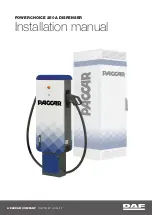
Eng
lish
INNOVATION & TECHNOLOGIE
6
7
• No changes should be made to the batteries. Never solder or weld directly to the cells.
• Released electrolyte is corrosive, not allow contact with skin or eyes. In an emergency,
rinse immediately with plenty of water and then consult a doctor.
• Suitable extinguishing media are extinguishing blankets, CO2 estinguishers and sand.
• The valve openings of the cells must not be blocked or sealed in any case, for example
by soldering. When soldering do not exceed a temperature of 220° C and for a period not
longer than 20 seconds.
• To avoid deformation, do not produce an excessive mechanical pressure.
• If a battery is overheated, proceed as follows:
Disconnect the battery and place it on a non-combustible surface (stone floor) until it has
cooled. Never keep the battery in your hand to avoid the risks of fire and / or explosion.
• Protect batteries from vibration, and do not expose to mechanical stresses.
• When charging and during operation of the batteries, they can generate explosive gas
(hydrogen), be careful with adequate ventilation.
•
Never short circuit the batteries. This might cause fire and / or explosion!
• Batteries may explode or burn through a defect. We therefore recommend that all lithium,
NiCd and NiMH batteries, should be charged in a LiPo safety case Order Nr. 8370 or 8371.
• Do not open batteries, chemical burn danger.
•
NiCd or NiMH battery packs perform their best by first individually all cells are dis
-
charged separately and only then the entire battery pack is charged. Discharging should
be done by the charger cell by cell.
• Make sure that the charge-discharge are done properly.
•
Charging single NiCd or NiMH cells or batteries with 1 ... 4 cells, can be difficult
for the automatic shut-off. Since the onset after the full load point voltage drop is
not very pronounced, the automatic shut-off cannot or do not respond properly.
The correct operation cannot be guaranteed in this case. Be sure to check through multi-
ple, monitored test charges, if a proper shutdown occurs for the batteries you are using.
There is a serious fire and / or explosion risk!
Capacity and use time
For all current sources applies: The capacity decreases with every charge. At low temperatures
the internal resistance increases reducing the capacity. As a result, the ability to provide power and
holding the voltage can be reduced.
Frequent charging and / or discharging programs can also lead to a gradual reduction in capacity.
However, current sources should be reviewed at least every 6 months on their capacity, and re-
place them if there is a significant loss of capacity.
Use only genuine Graupner batteries!
Disposal of waste batteries
Every consumer is legally obliged under the German battery ordinance to return all used
and exhausted dry and rechargeable batteries.
Disposal in the household waste is prohibited. Old batteries can be brought to the public
collection points or given at our retail outlets and wherever batteries of the same type are sold. You
can return used batteries sent by us to the following address:
Graupner|SJ
GmbH
Service: Gebrauchte Batterien
Henriettenstrasse 96
D-73230 Kirchheim unter Teck
You make a significant contribution to environmental protection!
Summary of Contents for POLARON EX-1400
Page 52: ...English 52 ...








































